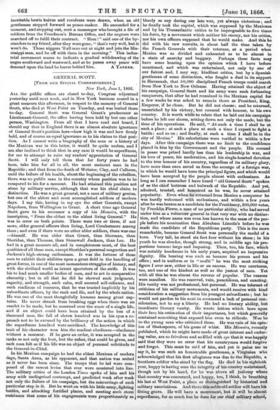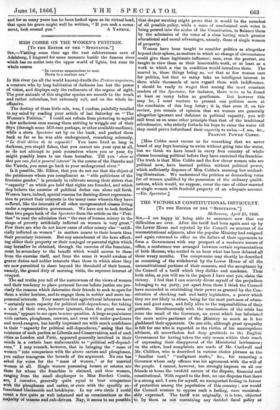GENERAL scurr.
[FROM OUR SPECIAL CORRESPONDENT.]
New York, June 1, 1866.
ALL the public offices are closed to-day, Congress adjourned yesterday until next week, and in New York business ceased in a great measure this afternoon, in respect to the memory of General Scott, who died at West Point on Tuesday, and was buried there to-day. General Scott was General Grant's predecessor as Lieutenant-General, the office having been held by but one other person, Washington. From all that I have read and heard, I should say that in England there is an almost absalute ignorance of General Scott's position here—how high it was and how firmly held, and of course an equal ignorance as to his claims to that posi- tion. As I cannot write a biography of the man or a history of the Mexican war in this letter, it would be quite useless, and I am also inclined to think that in any case it would be superfluous, for me to attempt to raise my readers' appreciation of General
Scott. I will only tell them that for forty years he had been, take him for all in all, the most eminent man in the Republic ; and that from the death of Webster, Clay, and Calhoun, until the failure of his health, about the beginning of the rebellion, there was no public man in the country whose position was to be compared to his for a moment. He had attained this position not alone by military service, although that was his chief claim to distinction. He was a great general, not a man of military genius, but one of the ablest and most accomplished soldiers of modern days. I say this, having in my eye the other Generals, except Napoleon, from Wellington to Grant. A short time ago General Scott gave to his successor a copy of his Memoirs, with the inscription, "From the oldest to the ablest living General." He was in error on both points. There were two or three, if not more, older general officers then living, Lord Combermere among them ; and even if there were no other abler soldiers, there was one —himself. He was abler than Grant, than Sherman, than Sheridan, than Thomas, than Stonewall Jackson, than Lee. He had in a great measure all, and in completeness most, of the best qualities of all these men, except Sheridan's personal magnetism and Jackson's high-strung enthusiasm. It was the fortune of these men to exhibit their abilities upon a great field in the handling of great forces, in one of the most momentous struggles of history, and with the civilized world as intent spectators of the strife. It was his to lead much smaller bodies of men, and to act in comparative obscurity ; but in all that he did he showed such judgment, sagacity, and strength, such calm, well assured self-reliance, and such readiness of resource, that he was trusted implicitly by his subordinate officers, by the rank and file, and by the whole nation. He was one of the most thoughtfully humane among great cap- tains. Ile never shrank from breaking eggs when there was an omelet to be made, but he mourned over the waste of a single life, and if an object could have been attained by the loss of a thousand men, the fall of eleven hundred was in his eyes a re- proach not to be excused by the brilliancy of the action in which the superfluous hundred were sacrificed. The knowledge of this trait of his character won him the readiest obedience—obedience without a murmur. If he gave an order, it was accepted in the ranks as not only the best, but the safest, that could be given, and each man felt as if his life was an object of personal solicitude to the General-in-Chief.
In his Mexican campaign he had the ablest Mexican of modern days, Santa Anna, as his opponent, and that nation was united as it never has been since. The troops that he led were com- posed of the rawest levies that ever were mustered into line. The military critics of the London l'imes spoke of him and his army with undisguised contempt, and predicted week after week not only the failure of his campaign, but the miscarriage of each particular step in it. But he went on with his little army, fighting battles, and attacking fortified places, and meeting such stout resistance that some of his engagements were proportionately as bloody as any during our late war, yet alwaya victorious ; and he finally took the capital, which was supposed by the Mexicans and by his Transatlantic critics to be impregnable to five times his force, by a movement which neither his enemy, nor his critics, nor his own officers supposed that he would make. And this he did with his raw recruits, in about half the time taken by the French Generals with their veterans, at a period when Mexico was so divided and exhausted as to be almost in a state of anarchy and beggary. Perhaps these facts may have some bearing upon the opinion which I have before mentioned, and which was entertained, not only by one of our fairest and, I may say, kindliest critics, but by a Spanish gentleman of some distinction, who fought a duel in its support in Havannah, that 50,000 disciplined French troops could march from New York to New Orleans. Having attained the object of his campaign, General Scott and his army were such forbearing conquerors, that after he had remained in the Mexican capital for a few weeks he was asked to remain there as President, King, Emperor, if he chose. But he did not choose ; and he returned, unenriched by his victory, but covered with honour, to his own country. It is worth while to relate that he laid out his campaign before he left our shores, setting down not only the mode, but the time of his operations. He said, "At such a time I shall be at such a place ; at such a place at such a time I expect to fight a battle ; and so on ; and finally, at such a time I shall be in the city of Mexico." His calculations were verified to within a few days. After this campaign there was no limit to the confidence placed in him by the Government and the people. His counsel in pease was prized hardly less than his leadership in war, and his love of peace, his moderation, and his single-hearted devotion to the true honour of his country, regardless of its military glory, have more than once saved us from the scourge of a foreign war, in which he would have been the principal figure, and which would have been accepted by the people almost with enthusiasm. As long as I can remember I have heard "old General Scott" spoken of as the chief buttress and bulwark of the Republic. And yet, admired, trusted, and honoured as he was, he never attained popularity. Even when he returned from Mexico a conqueror he was hardly welcomed with enthusiasm, and within a few years after he was beaten as a candidate for the Presidency, 300,000 votes, by Franklin Pierce, a man of no particular ability, who had served under him as a volunteer general in that very war with no distinc- tion, and whose name was even less known to the mass of the peo- ple before his nomination than Abraham Lincoln's before he was made the candidate of the Republican party. This is the more remarkable, because General Scott was personally the model of a hero. Very tall, he stood six feet four without his shoes ; in his youth he was slender, though strong, and in middle age his pro- portions became large and imposing. Then, too, his face, which was notably handsome in his early years, acquired an impressive dignity. His bearing was such as became his person and his office ; and in uniform or in " muf " he was the most striking figure I ever saw, either in life or on canvas. He was courteous, too, and one of the kindest as well as the juate.3t of men. Yet with all this he was almost the reverse of popular. The reasons were manifest. He was reserved, vain, punctilious, and exacting. His vanity was not professional, but personal. He was tolerant of criticism of his military movements, and would receive with kind consideration a suggestion from his youngest subordinate ; but he would not pardon to his next in command a lack of personal con- sideration, not to say a liberty. He had no literary ability, but inordinate literary vanity. He wrote letters which bore upon their face his estimation of their importance, but which generally contained something that exposed him even to ridicule. Woe be to the young man who criticized these. He was vain of his opin- ion of Shakespeare, of his game of whist. His Memoirs, recently published, which he might have made of great interest and endur- ing value, are so frivolous and so filled with ego that it was happily said that they were an error that his countrymen would forgive and forget. This must be said of him, and yet it pains me to say it, he was such an honourable gentleman, a Virginian who acknowledged that his first allegiance was due to the Republic, a Southern soldier who stood by the flag. He died in his eightieth year, happy in having seen the integrity of his country maintained, though not by his hand, for he was above all jealousy where that country was concerned, and happy, too, I think, in breathing his last at West Point, a place so distinguished by historical and military associations. And there this noble old soldier will have his fitting grave. lie will have a monument, but it will be almost superfluous, for so much has he done for our chief military school,
and for so many years has he been looked upon as its virtual head, that upon his grave might well be written, "If you seek a monu-































 Previous page
Previous page